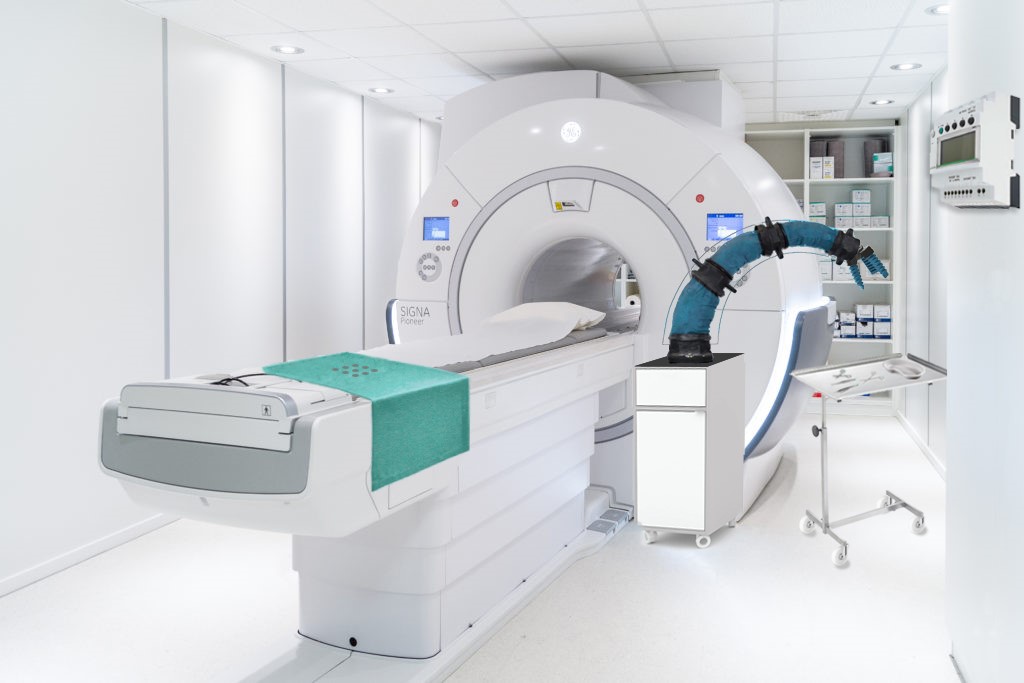NEWS
Neues Kooperationsprojekt erforscht robotische Unterstützung bei MR-Eingriffen
Zum Juni 2024 startete am Forschungscampus STIMULATE das Forschungs- und Entwicklungsprojekt „Entwicklung eines MR-kompatiblen Roboterassistenzsystems für die Anwendung in medizinischen Großgeräten“ (MRAssist). Das Projekt wird für zweieinhalb Jahre vom Bundesministerium für Wirtschaft und Energie im Zentralen Innovationsprogramm Mittelstand (ZIM) geförderte und wurde innerhalb des ZIM-Netzwerks INSTANT beantragt. Die industriellen Kooperationspartner ITP GmbH und Mehnert GmbH erforschen und entwickeln zusammen mit dem akademischen Partner Otto-von-Guericke-Universität Magdeburg am Forschungscampus STIMULATE in der Forschungsgruppe interventionelle Magnetresonanztomographie (RG iMRI) eine roboterbasierte Lösung, die das medizinische Personal bei der Durchführung minimalinvasiver Prozeduren in einer MR-Umgebung unterstützt.
Aufgrund des Fachkräftemangels im medizinischen Bereich können viele onkologische Behandlungen nicht zeitnah umgesetzt werden, Roboter bieten hier eine Möglichkeit, medizinisches Personal zu entlasten. Speziell in einer MR-Umgebung ist ein Einsatz derartiger Technik mit besonderen Herausforderungen verbunden: zum einen darf die Elektronik eines Roboters die MR-Bildgebung nicht stören, zum anderen darf das Material aufgrund des Einsatzes in unmittelbarer Nähe zum MRT nicht ferromagnetisch sein. Im Rahmen des Projekts soll daher ein Roboterassistent entwickelt werden, der aus einem Roboterarm, dessen Bewegungen über einen Bowdenzug realisiert werden, und einer Greifvorrichtung, die auf Basis einer pneumatischen Saugvorrichtung arbeitet, besteht. Die Steuerung der mechanischen Komponenten mittels KI-gestützter Gestenerkennung ist ein weiteres Teilprojekt im Rahmen von MRAssist.
Die im Projektverbund realisierten Arbeiten sollen schlussendlich in der gemeinsamen Inbetriebnahme des Gesamtsystems in der realen MR-Umgebung in Form eines Prototyps zusammengeführt werden, welches im Anschluss vermarktet werden soll.
Bild: schematischer Aufbau eines Roboterarm-Setups. Forschungscampus STIMULATE.
Image: schematic structure of a robot arm setup. Research Campus STIMULATE .
New cooperation project researches robotic support for MR interventions
The research and development project "Development of an MR-compatible robotic assistance system for use in large medical devices" (MRAssist) was launched at the Research Campus STIMULATE in June 2024. The project is being funded for two and a half years by the Federal Ministry for Economic Affairs and Energy in the Central Innovation Program for SMEs (ZIM) and was applied for within the ZIM network INSTANT. The industrial cooperation partners ITP GmbH and Mehnert GmbH, together with the academic partner Otto von Guericke University Magdeburg, are researching and developing a robot-based solution at the Research Campus STIMULATE in the interventional magnetic resonance imaging research group (RG iMRI) that supports medical staff in carrying out minimally invasive procedures in an MR environment.
Due to the shortage of specialists in the medical field, many oncological treatments cannot be carried out promptly, and robots offer a way of relieving the burden on medical staff. Especially in an MR environment, the use of such technology is associated with particular challenges: on the one hand, the electronics of a robot must not interfere with MR imaging, and on the other hand, the material must not be ferromagnetic due to its use in the immediate vicinity of the MRI. The project therefore aims to develop a robot assistant consisting of a robot arm, whose movements are realized via a Bowden cable, and a gripper device that works on the basis of a pneumatic suction device. The control of the mechanical components using AI-supported gesture recognition is another sub-project within MRAssist.
The work carried out in the project network will ultimately be brought together in the joint commissioning of the overall system in the real MR environment in the form of a prototype, which will then be marketed.
